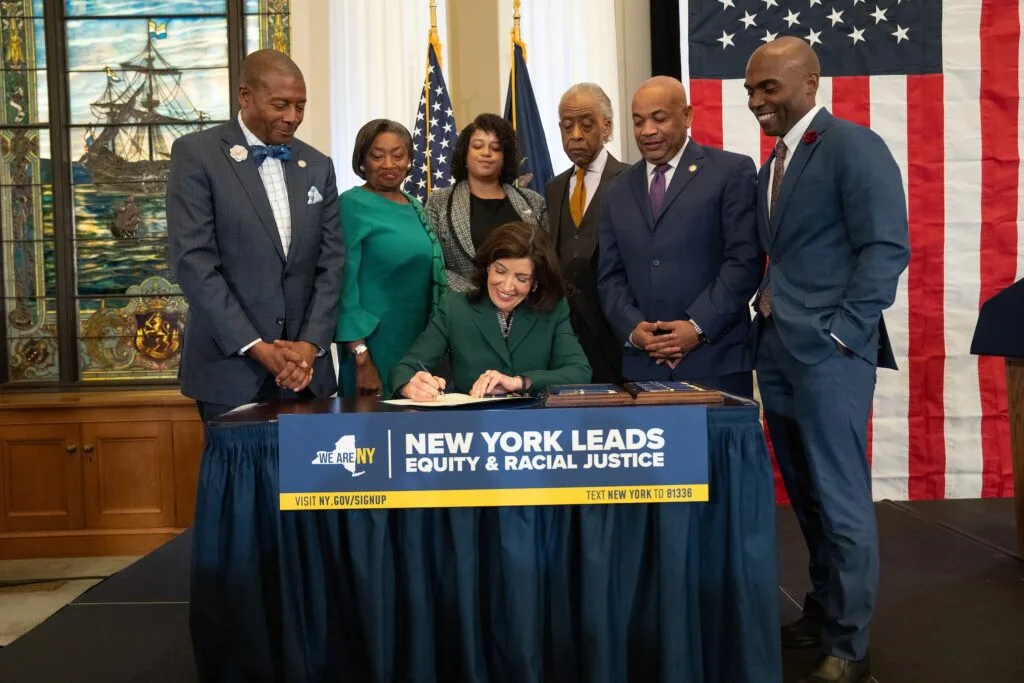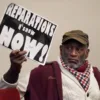
Senator James Sanders Jr. (left) smiles as Gov. Kathy Hochul signs his reparations bill into law. Photo courtesy of the Governor’s Office.
NYS Senator James Sanders Jr. celebrated a “momentous victory” earlier this week on Tuesday, Dec. 19 when Gov. Kathy Hochul signed his Senate Bill S1163A into law, establishing the “New York State Community Commission on Reparations Remedies.”
The new nine-member commission will “research the harm from slavery and after slavery” in New York and recommend “remedies and reparations” as a result of the findings. Sanders, who has long advocated for reparations, called the new legislation “a monumental step forward in our fight for racial justice.”
“This is a day that will be etched in the annals of our state’s history,” Sanders said. “Today, we plant a seed of hope, not just for the City of New York and New York State, but for the nation,” he continued. “Let this be a beacon, a call to action for every corner of this country to confront their own histories, to acknowledge the injustices that bind us, and to work together towards a future where reparations are not just a word, but a lived reality for all.”
While it remains unclear what the “reparations” will actually amount to, the commission is required to deliver a report one year after its first meeting with recommendations that could include monetary compensation of some sort that would be non-binding. The goal, according to a statement from Sanders’ office, is for the commission’s findings to determine how New York can “reverse such injuries” in policy changes, new programs and public education.
Both Sanders and Assemblywoman Michaelle C. Solages were the chief sponsors of the new legislation. The New York State Legislature passed the bill earlier this year with a 41-21 vote in the Senate and a 106-41 vote in the Assembly. Among those who voted in favor of the bill on June 8, 2023 were NYS Senator Joseph P. Addabbo Jr., Assemblywoman Stacey Pheffer Amato and Assemblyman Khaleel Anderson.
Anderson stood alongside Sanders shortly after the bill was signed into law on Tuesday. In a statement, Anderson echoed Sanders’ optimism that the new commission will address “the realities of structural racism and inequality that Black New Yorkers have endured for centuries.”
“Governor Hochul’s signature today is a momentous occasion and call to action for America, signaling New York State’s sober commitment to a reckoning with its role in anti-Black racism, violence, and genocide,” Anderson said. “I thank Governor Kathy Hochul for signing this historic bill into law, ensuring that the Empire State finally begins to redress its harms by prioritizing truth and reconciliation for Black New Yorkers.”
With the legislation, New York’s new commission becomes the nation’s third statewide task force to consider reparations, following similar efforts previously established in California and Illinois. Even with the new legislation, the idea of reparations remains a hot-button issue nationwide, especially here in New York.
On Wednesday, Col. Thomas Sullivan, who is running for State Assembly next year, criticized the legislation and the New York State Legislature, adding that they “seem to be obsessed with race.”
“While there is no denying the heinous practice and aftermath of slavery in this country, this bill would only make New Yorkers less well off and would divide our state,” Sullivan said. “This legislation reveals that the Democratic majority in Albany is beholden, not to the people, but to the radical activists that seek to divide our state along racial lines.”
NYC Council Minority Leader Joe Borelli expressed his opposition to a similar reparations bill introduced by Councilwoman Farah Louis earlier this year. “I’ll leave the state before I pay a dime in taxes to compensate any New Yorker for a 200-year-old crime I didn’t commit,” Borelli said.
In July, The Wave conducted a poll, asking readers whether they supported the Sanders-sponsored legislation. Approximately 80% voted no while close to 20% voted in favor.
On Dec. 8, Sanders, along with NYC Councilwoman Selvena Brooks-Powers, hosted a discussion on reparations at York College. During the panel, which also featured Assemblyman Khaleel Anderson and Councilwoman Nantasha Williams, attendees became frustrated when the elected officials present would not state an exact monetary amount for reparations.
“The check is the least of the things that we’re talking about,” Sanders responded. “You cannot put a dollar amount on the misery that our people have suffered.”
“If you want a specific dollar amount, you should present that to the commission,” Anderson added. “At that commission, your voices can be heard as to what specific remedies should exist.”
On Tuesday, Hochul shared her initial reservations about the concept of reparations, fearing that the new legislation could lead to “racial division and strife.” Still, Hochul emphasized the importance of having “a reasoned debate” on this particular issue.
“To those who think that even having this conversation is unfair or wrong, I say it would be wrong not to have it,” Hochul said. “To bend that arc of justice, we have to be willing to talk about the hard things.”


